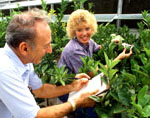|
Virginia Tech: (Chuan Hong )
Crop health presents a major sustainability issue to local nursery and greenhouse industry in an increasingly competitive global market. This issue recently has aggregated with increased use of recycled water for irrigation. In order to address the industry’s growing concern over crop health risk, a group of plant pathologists at Virginia Tech have diligently worked on mitigation technologies targeting at Phytophthora diseases. The pathogen name Phyto-phthora has a Greek origin, meaning “plant destroyer”. The annual crop losses caused by this group of pathogens in the horticultural industry are estimated in billions of dollars. These pathogens are commonly referred as “water mold”.
A major focus of our research is to decouple crop health risk from recycling irrigation practices. Over the past 9 years, our research has filled several major knowledge gaps about the etiology and epidemiology of Phytophthora diseases. We
- identified twelve plant pathogenic Phytophthora species, including two new species and three first reports of species in nursery irrigation systems;
- demonstrated that contaminated water can be the sole source of Phytophthora for disease epidemics;
- established a pathogen threshold;
- improved conventional pathogen monitoring methods and produced novel molecular assays for rapid and accurate detection of P. nicotianae and P. cinnamomi, which are the most important pathogenic species of Phytophthora in nursery production; and
- improved water chlorination protocols which have been widely adopted by the green industry for disease control in Virginia and nationwide.
We are developing biologically-based, innovative alternative water decontamination technologies that are economically effective, environmentally sound, and socially acceptable. Specifically, in cooperation with scientists in the Pennsylvania State University and University of Maryland, we are investigating the aquatic ecology of Phytophthora species in irrigation reservoirs, aiming at development of a guiding protocol to assist farmers locate pump house and inlet placement depth for minimal inoculum intake. We are also working with mechanical engineers at Old Dominion University and scientists at USDA/ARS-Southern Horticultural Lab and investigating the impacts of hydrostatic pressure, agitation, and carbon dioxide on the survival of zoospores, the principal dispersal and infective structure of Phytophthora species. The goal of this project is to develop a device that can be incorporated into irrigation lines and decontaminate water physically or chemically before it reaches crops.
|





